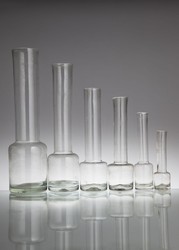Interview with Ján Kautman
Jozef Lenhart
Until the mid-18th century, glassware was produced solely for the wealthy. The clientele broadened only in the late 18th century; in the latter part of the 19th century glassware found its way also to rural households. Glass peddlers would distribute glassware to more distant areas, hence also better-off farmers and pub keepers could afford to buy it an adequate quality. The production was dominated by pub articles including pijačky or komínky (shot glasses) for pálenô (hard liquor), quadrangular little bottles for hard liquor, thick-walled octagonal glasses, flat containers with a small handle for holy water, small flat pocket bottles (ploskačky), and for households mucháre (fly catchers) and small kerosene lamps. Luxury items were also part of this inexpensive production, represented by guild, baptism and wedding bottles with dedications. They were given as presents with their contents and were custom decorated. No rich wedding or admission in the guild or a life jubilee celebration would do without them. Nobody would then mind that they were made of poor quality molten glass and that there were blebs in the glass, or that the glass did not have a perfectly smooth surface. On the contrary, the imperfections are part of the value sought after by collectors and experts. One of those people who got mesmerized by simple beauty of Slovak folk glassware is Ján Kautman, by profession a zoologist in the Slovak National Museum. He has been building the collection of glass for twenty years.
Pijačky are a central European glass-making rarity. They were used not only in Slovakia but also in northern Serbia, Hungary and Rumania, in the area of Ruthenia, partly in Poland and marginally in the Czech Republic and Austria. Essentially, they are small shot glasses. Typical for Upper-Hungary – Slovak are pijačky with a cylindrical body and a relatively long neck, whereas pijačky made in southern parts of Central Europe have a rather bulbous body. They were made as specific glassware for pubs.
